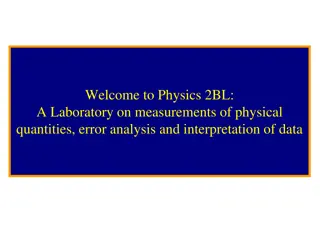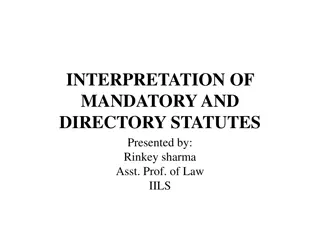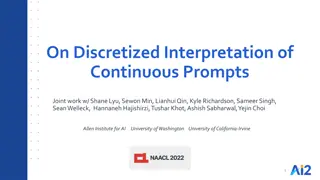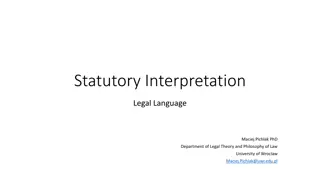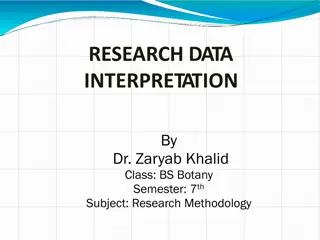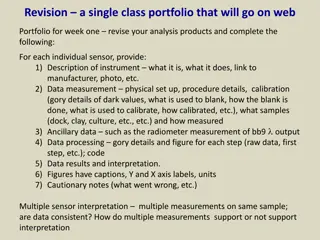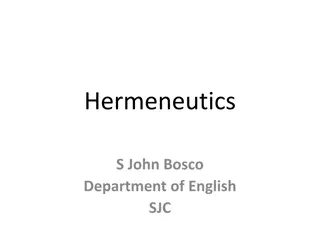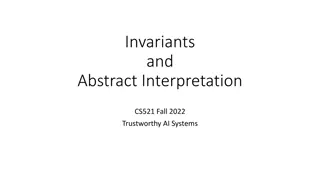Interpretation
Interpretation in research methodology involves drawing inferences from collected data, establishing continuity in research, and developing explanatory concepts for future studies. It helps researchers understand abstract principles, make predictions, and maintain research continuity. Interpretation is vital for appreciating findings, generating hypotheses, and transitioning between exploratory and experimental research. Precautions in interpretation include ensuring data reliability and validity, avoiding errors, and refraining from broad generalizations.
Download Presentation

Please find below an Image/Link to download the presentation.
The content on the website is provided AS IS for your information and personal use only. It may not be sold, licensed, or shared on other websites without obtaining consent from the author. Download presentation by click this link. If you encounter any issues during the download, it is possible that the publisher has removed the file from their server.
E N D
Presentation Transcript
Interpretation in Research Methodology Interpretation refers to the task of drawing inferences from the collected facts after an analytical and/or experimental study. In fact, it is a search for broader meaning of research findings. The task of interpretation has two major aspects : 1. The effort to establish continuity in research through linking the results of a given study with those of another 2. The establishment of some explanatory concepts Interpretation is concerned with relationships within the collected data and the extension of study beyond the collected data as well. Thus, interpretation is the device through which the factors that seem to explain what has been observed by researcher in the course of the study can be better understood and it also provides a theoretical conception which can serve as a guide for further researches.
1. It is through interpretation that the researcher can well understand the abstract principle that works beneath his findings. Through this he can link up his findings with those of other studies, having the same abstract principle, and thereby can predict about the concrete world of events. Fresh inquiries can test these predictions later on. This way the continuity in research can be maintained. Why is Interpretation Essential? 2. Interpretation leads to the establishment of explanatory concepts that can serve as a guide for future research studies; It opens new avenues of intellectual adventure and stimulates the quest for more knowledge.
Why is Interpretation Essential? Cont.. 3. Researcher can better appreciate only through interpretation why his findings are what they are and can make others to understand the real significance of research findings. 4. The interpretation of findings of exploratory research study often results into hypothesis for experimental research, and as such interpretation is involved in the transition from exploratory to experimental research. Since an exploratory study does not have a hypothesis to start with, the findings of such a study have to be interpreted on a post-factum basis, in which case the interpretation is technically described as post-factum interpretation.
Precautions in Interpretations 1. At the outset, researcher invariably satisfy himself that (a) the data are appropriate, trustworthy and adequate for drawing inferences; (b) the data reflect good homogeneity, and that (c) proper analysis has been done through statistical methods. 2. The researcher must remain cautious about the errors that can possibly arise in the process of interpreting results. Errors can arise due to false generalization and/or due to wrong interpretation of statistical measures, such as the application of findings beyond the range of observations, identification of correlation with causation and the like. 3. He must always keep in view that the task of interpretation is very much intertwined with analysis and cannot be distinctly separated. Take all those precautions that one usually observes while going through the process of analysis viz., precautions concerning the reliability of data, computational checks, validation and comparison of results. 4. Broad generalization should be avoided as most research is not amenable to it because the coverage may be restricted to a particular time, a particular area and particular conditions. Such restrictions, if any, must invariably be specified and the results must be framed within their limits. 5. The researcher must remember that in the course of a research study, there should be constant interaction between initial hypothesis, empirical observation and theoretical conceptions. For better interpretation of findings, the interaction between theoreticalorientation and empirical observation is important.





